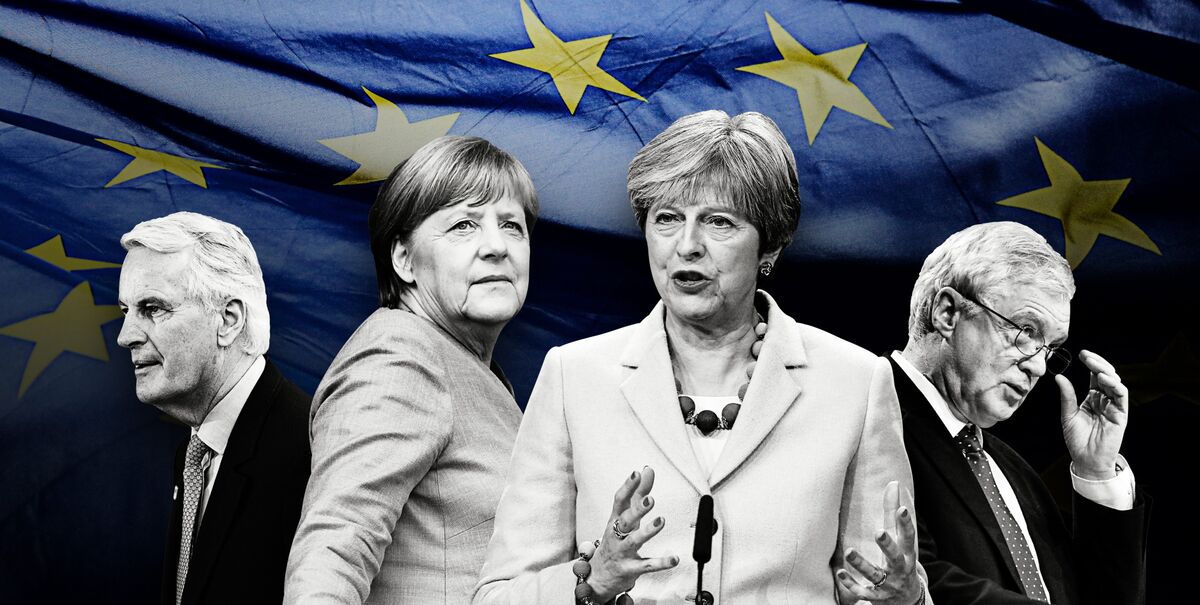
Sign up to receive the Brexit Bulletin in your inbox, and follow @Brexit on Twitter.
More than 18 months after Britain voted to leave the European Union, U. ministers were widely expected this week to finally agree on what kind of Brexit they want. In fact, they’re not even close, Tim Ross reports.
The EU side is expecting an update Friday on the U.’s vision of the future relationship, but a senior U. official said ministers almost certainly won’t reach an agreement by then. The government’s final proposal for the type of customs arrangement it wants with its biggest trading partner after the split is far from ready, as a lot more technical work needs to be done.
In another worrying sign for business, the official said the March deadline to get the transition deal pinned down is now looking optimistic. (It’s worth remembering that Ian Wishart reported last week that officials on both sides were privately expressing concern that the March deadline might slip.)
Amid pressure from the euroskeptic wing of her party, Prime Minister Theresa May has promised to fight some of the EU’s conditions for the transition, and U. objections were raised on Tuesday in Brussels.
As the debate on what a post-EU Britain ought to look like rages on in the ruling Conservative Party, further sessions of May’s so-called Brexit war cabinet are being lined up for next week. They could even continue into the following week if necessary, according to the official. The person declined to be identified because the talks are private.
Even when May’s ministers do agree on the broad outline for Britain’s ultimate ties to the EU, they won’t be close to finalizing the kind of customs arrangement that the government wants to have with Europe, the official said. That’s because the two options under consideration – a customs “partnership” or a “streamlined customs arrangement” – require much more technical work before they can be properly assessed.
May needs to be careful with the naming of any such arrangements as well as its consequences: She has promised euroskeptics that the U. is leaving the customs union and will be able to strike deals with other countries after the split.
Brexit Latest
More Money | The European Commission said the U. will be asked to make financial contributions after Brexit that could go beyond what was agreed last year, reports Bloomberg’s Nikos Chrysoloras, who saw a draft document on the EU’s stance on the transition period. While the extra liabilities are likely to be small because they’re for security and defense costs outside the regular budget, revisiting the financial settlement could add strain to already tense discussions.
More Fighting | The EU is threatening to suspend the U. from the benefits of the single market unilaterally if it breaks any rules during the transition period, the European Commission document showed. That’s not great news for businesses that want a transition precisely because it guarantees continued complete access to the single market., meanwhile, has objected to seven aspects of the EU’s position on the transition period, Chrysoloras reports.
Losing Airbus | Since it was cobbled together from a passel of national aerospace groups a half-century ago, Airbus SE has spread its operations across Europe in a delicate effort aimed at maximizing political expediency without sacrificing too much economic efficiency. As Brexit looms, the quid pro quo is poised to become more complicated amid pressure to manufacture outside Europe, Carol Matlack, Benjamin Katz and Ania Nussbaum report.
Urgent Appeal | The British Chambers of Commerce called for an urgent end to the government’s ambiguity on Brexit in an open letter to Prime Minister Theresa May. “Directly-affected companies are poised to activate contingency plans. Many others, worryingly, have simply disengaged,” the group said.
Irish Threats | Irish Prime Minister Leo Varadkar said it’s “right” to be concerned that the border question between Ireland and the U.’s Northern Ireland remains to be fully settled in Brexit talks, a veiled warning to Britain that a resolution is needed before discussions move to trade. The border issue “isn’t done yet,” Varadkar said in parliament. It’s “significant” that the focus now is on the withdrawal agreement rather than the future relationship, he said.
View from Croatia | Brexit is the result of “populism and a campaign of disinformation,” Croatian Prime Minister Andrej Plenkovic told the European Parliament.
On the Markets | The pound fell for the third day against the dollar on Tuesday to the lowest level in more than two weeks as a deepening slump in global equities rattled currency markets. Sterling traded at $1.3982 early on Wednesday.
The tone of the European Commission’s latest document on transition was enough to raise the eyebrows of even the most willing subject of a vassal state. We all knew that following EU rules and not getting a voice or a vote was the price of the transition that businesses are so desperate to pin down. But did they have to be so blunt?
“For the purposes of the Treaties, during the transition period, the parliament of the United Kingdom shall not be considered to be a national parliament,” the document reads. It gets worse: “During the transition period, the Bank of England shall not be considered to be a national central bank.”
Brexit hard-liner Jacob Rees-Mogg will surely have something to say about that.
For more on Brexit follow Bloomberg on Twitter, Facebook and Instagram.


0 comments:
Post a Comment